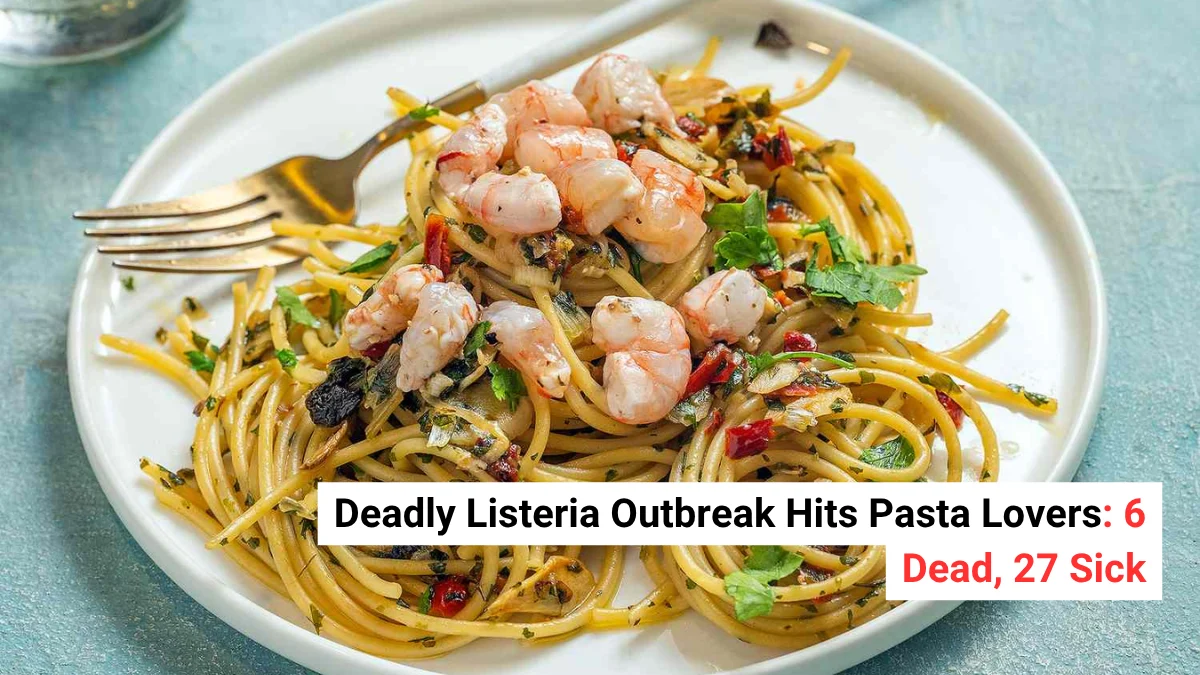A quick pasta meal should never turn into a health threat. But that’s exactly what’s happening across the U.S. right now.
As of November 3, 2025, a Listeria outbreak connected to pre-cooked pasta has taken six lives and left 27 people ill in 18 states.
Most of the infected have been hospitalized, and experts warn that symptoms can take up to 10 weeks to appear meaning some people may have eaten contaminated pasta months ago without realizing it.
Health authorities including the CDC, FDA, and USDA are urging everyone to check their fridge and freezer immediately.
Key Takeaways On Listeria Prepared Pasta
- Check for recalls and lot codes on pasta and deli salads.
- 6 deaths and 27 illnesses across 18 states tied to pre-cooked pasta.
- Source traced to Nate’s Fine Foods products distributed nationwide.
- 93% hospitalization rate, among the highest seen in recent outbreaks.
- Listeria can survive refrigeration, making leftovers risky.
How the Outbreak Started
The investigation points to Nate’s Fine Foods, a California-based manufacturer that produces popular ready-to-eat pasta items like fettuccine, linguine, and farfalle.
Their products were sold under various store labels, including Walmart, Kroger, Trader Joe’s, Sprouts, and Albertsons.
On September 30, the company recalled around 245,000 pounds of pasta, but reports suggest that the contamination had already spread before the recall went public.
Recalled Items Overview
| Store/Brand | Product Examples | Sold Between | Where |
|---|---|---|---|
| Trader Joe’s | Cajun Chicken Fettuccine Alfredo (16-oz tray) | Up to Oct 10, 2025 | Nationwide |
| Kroger | Bowtie Pasta Salad, Penne Pasta Salad | Aug 29 – Oct 2, 2025 | Nationwide |
| Sprouts | Smoked Mozzarella Pasta Salad | Oct 10 – 29, 2025 | 23 states |
| Walmart (Marketside) | Linguine with Beef Meatballs, Chicken Alfredo | Use-by up to 9/14/2026 | Nationwide |
| Albertsons/Safeway | Bowtie & Penne Pasta Salads | Sept – Oct 2025 | Nationwide + AK |
Consumers are advised to check for lot codes such as 2572521 or visit the CDC recall page for the full list.
Why This Strain Is So Dangerous
Listeria is not a typical foodborne germ. It can multiply even in cold temperatures, which makes refrigerated food a perfect hiding place.
Most of these pasta dishes are designed to be “heat and eat,” so there’s no strong cooking step to destroy bacteria before eating.
It mainly affects pregnant women, newborns, older adults, and people with weak immune systems. Symptoms such as fever, muscle aches, stiff neck, and confusion can easily be mistaken for mild flu, delaying treatment.
Several families are already grieving. One Oregon family lost a grandparent, and another in Texas lost a newborn due to pregnancy complications linked to Listeria infection.
Growing Public Concern
The conversation online is intense, especially on X where hashtags #Listeria and #PastaRecall have been trending with over 50,000 posts in a week.
- “Threw out $80 worth of Trader Joe’s meals. Not worth the risk.” – @MomOfThree_CA
- “Why did it take 6 deaths to recall 245K lbs?!” – @FoodSafetyDad
- “Bronze-die pasta > Teflon junk. Rao’s gang rise up.” – popular comment thread
Some users are even creating state-by-state outbreak maps, with Oregon and Illinois showing the most activity so far.
What You Should Do Now
- Check your fridge and freezer for deli pasta salads or ready-to-eat meals.
- Throw away or return recalled items. Do not taste to “check” them.
- Clean your fridge thoroughly using hot, soapy water followed by a mild bleach solution.
- Monitor symptoms, especially if you’re pregnant or over 65.
- Spread the word a simple alert can help prevent another tragedy.
Outlook and Ongoing Testing
The CDC reports that no new brands have been linked yet, but additional testing is underway. More recalls could be announced soon.
Meanwhile, some consumers are shifting toward freshly cooked or bronze-die pasta known for fewer additives and safer production processes. Others are reconsidering frozen meals altogether.








